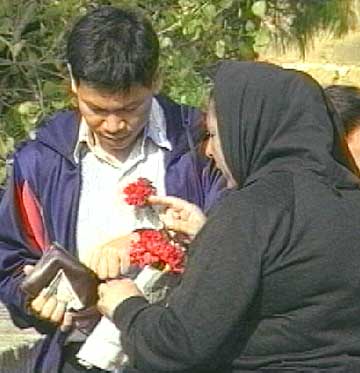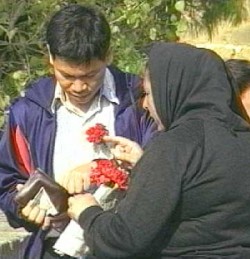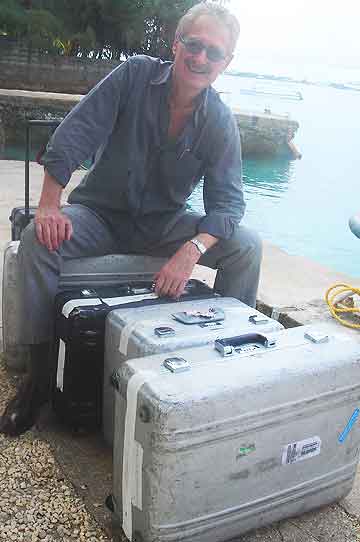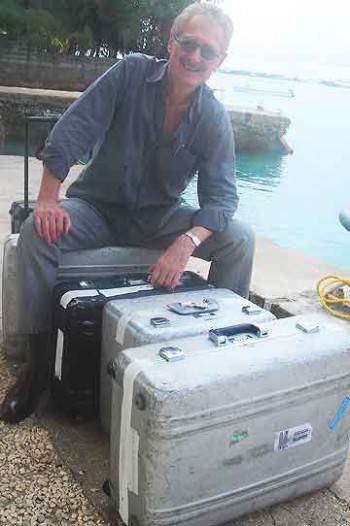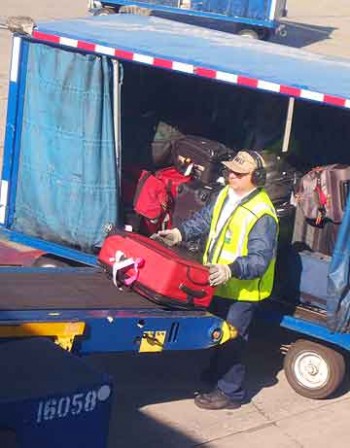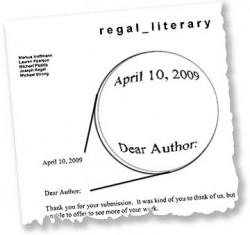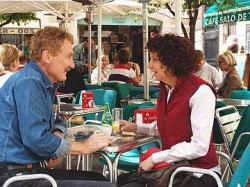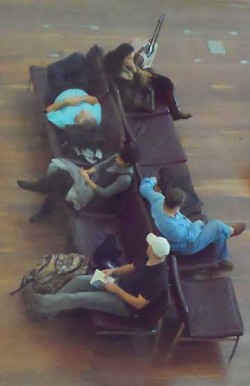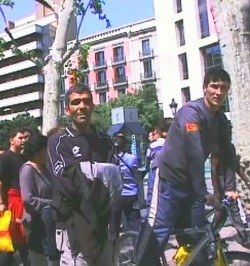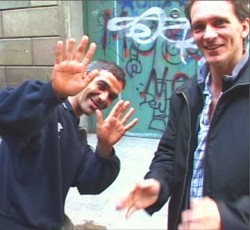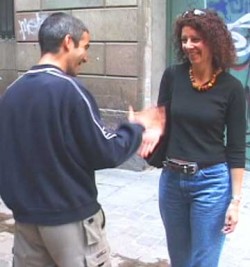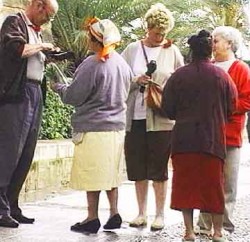
Palma de Mallorca, Spain— Thirty to forty women practice this form of filching every day in Palma. They linger where the tourists are: around Palacio Almudiana in particular, and in the small cobblestone streets around Plaza Mayor. The women perform one-on-one, but they work in groups. We see them walk “to work” in gangs of six or seven, gossiping merrily along the way. As they approach their territory, they don their “uniforms,” tying dark aprons around their waists, scarves on their heads. Many are younger women, in their 30s, 40s, and 50s. The youngest eschew the scarves and, instead of aprons, tie jackets around their waists, keeping the pockets available.
At Palacio Almudiana, we planted ourselves at the end of an elevated walkway to the Moorish fortress. We had a JVC professional video camera on a tripod that day—a huge, heavy thing—and with its long fine lens we could film close-ups unnoticed at a distance.
From around a corner at the far end of the stone walkway appeared a group of six men—German tourists, we later learned. Happily oblivious, they had just toured the fortress. As they turned into the otherwise empty walkway, five women from the morning babushka brigade rushed after them, literally running, with heavy, effortful steps. The eldest woman found a victim first, grabbing the arm of one of the men and roughly poking a flower into his shirt. As she began her swindle, her colleagues, all four of them, attached themselves to four others of the men. In a jolly, holiday mood, the men allowed the women’s aggressive physical appeal without suspicion.

It only took about two minutes. One by one the men broke free, some wearing red carnations, some not. As they sauntered towards us on the walkway, folding and replacing their wallets, the five women regrouped behind them and disappeared around the far corner. Bob stopped three of the Germans.
“Did you lose any money?” he asked, without explaining what we’d just witnessed.
“And why would we?” one of the men challenged.
“I saw you with some thieves,” Bob said. “Count your money.”
All three brought forth their wallets and checked their contents.
“Fifteen thousand pesetas—gone!” one of them shouted. That was about U.S. $85 at the time.
“They got twenty-five thousand from me,” said another, “and now I realize how. She said she wanted a peseta and I tried to give it to her. But she returned it and now my money is gone.”
“I was pinching the wallet like so,” the third man explained smugly. “She wanted to get into the wallet, but I didn’t let go. I have all my money.”

We filmed numerous encounters by this gang and by others, in this location and around the town, on this day and over the course of ten years. Without speaking to each victim, it’s impossible to state the percentage of these thieves’ success. Even the victims aren’t always certain whether or not a few bills have been taken, or how much money they started with. Only the thieves know for sure. Clearly, it’s a worthwhile game for them.
In one brilliant piece of footage, several women can be seen earnestly engaged in their one-on-one scams. We pan from one encounter to another, close up. One of the women is seen “closing her deal,” pushing her left fistful of flowers against her opponent’s wallet. As she steps back, apparently satisfied, she loses her grip and money flutters to the ground.
The victim and thief both notice, one puzzled, the other disgusted.
In another scene, an Asian visitor smiles delightedly when a bright red carnation is tucked into his shirt pocket. The old woman, dressed in black from head to toe, raises one finger. One peseta, she requests. The tourist withdraws his wallet and offers a bill, still smiling. Taking the money, the woman raises her finger again, then returns the bill. As the Asian tourist replaces his money, the thief moves in on his wallet and a subtle battle ensues. The man’s expression begins to shift from pleasure to perplexity, then consternation. The woman, defeated, snatches back the flower and moves on.
This is Part 2 of The Flower Gift Lift. Read Part 1 — Read Part 3
Excerpt from Travel Advisory: How to Avoid Thefts, Cons, and Street Scams
Chapter Seven: Scams—By the Devious Strategist


